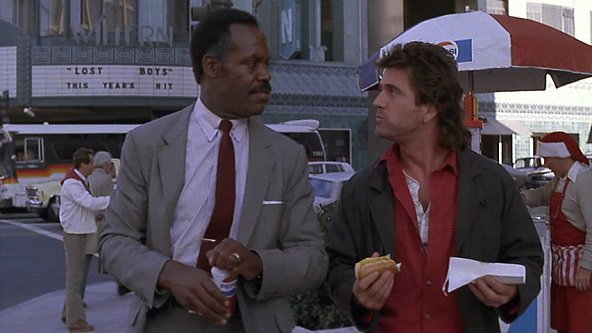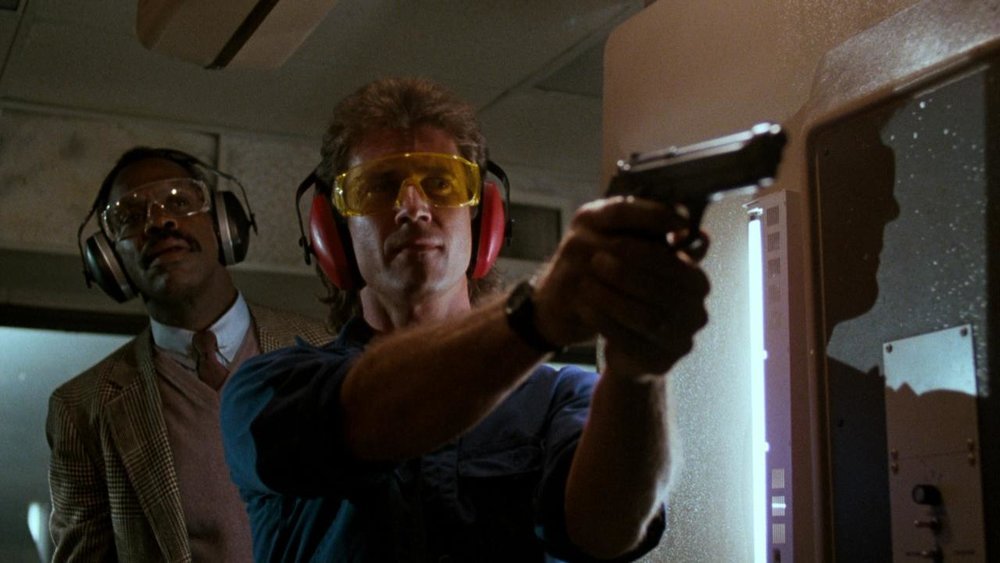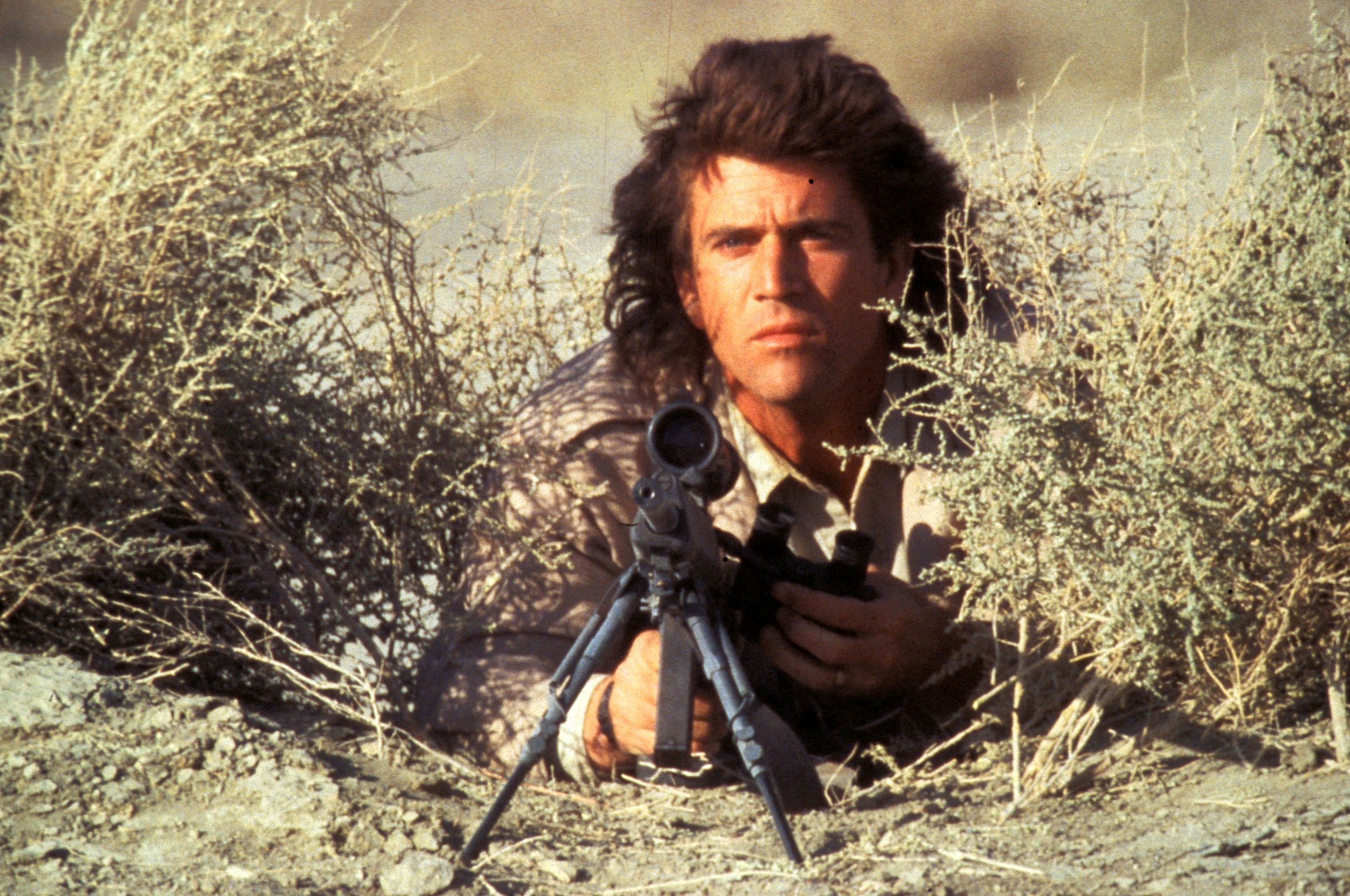LETHAL WEAPON: A Very (Shane) Black Christmas!
A CHRISTMAS STORY. IT’S A WONDERFUL LIFE. HOME ALONE. NATIONAL LAMPOON’S CHRISTMAS VACATION. WHITE CHRISTMAS.
The “official” Christmas film canon is somewhat brief, if nevertheless solid. It’s become a lucrative and expansive genre in recent years, thanks to The Hallmark Channel’s infamous churning out of approximately two billion Christmas movies a week, a business practice so hacky that making jokes about it has actually become hacky.
I think the reason the Official Christmas Movie Nice List has become so hallowed is because there doesn’t seem to be that many of them. Halloween provides so many opportunities for watch-list customization due to the fact that horror and suspense thrillers are their own year-round genre. Anything can be watched in the month of October if it passes the “spooky season” vibe check. GET OUT? Halloween movie. THE SHINING? Halloween movie. SUSPIRIA? Halloween movie. HALLOWEEN? Fourth of July movie. Just kidding. Halloween movie.
Christmas, though? Generally speaking, a Christmas movie has to at the very least have one scene that is set on the actual holiday in question. At least one door has to have a wreath or something on it. However, for most people, it seems, Christmas has to be the defining theme of the film for it to count as a “Christmas movie”. It has to be the reason any of these characters are even talking to each other. People all have their own defining lines, but generally, what constitutes a Christmas movie is limited for most.
And that’s a shame for me! One of my great cinematic joys are movies that simply use Christmas as a window dressing for the rest of its story. Christmas as a dramatic vessel, if you will. The “non-Christmas Christmas” movie. It’s an easy way to expand the field of holiday movies and include some of the best, sweetest and most fun films ever made.
And nobody in Hollywood does the “non-Christmas Christmas movie” better than Shane Black. One of the big action screenwriters to come out of the 80’s/90’s blockbuster-issance, Black stood ahead of his peers by having a palpable, almost satiric sense of humor. Where others like Joe Eszterhas made his millions with bullets and greased-up breasts (both male and female), Black wrote his scripts almost like a meta-novel; within his LETHAL WEAPON screenplay, he once described a drug lord’s mansion as “the kind of house I’ll buy if this movie is a huge hit”.
And he loves Christmas! It’s become a staple of A Shane Black Joint to be arbitrarily set during the holidays. Hell, his scripts and movies didn’t even need to be released particularly near December 25th. They can come out in March, May, whenever. Characters are still wearing Santa hats, no matter what.
To honor the strange career arc of this blessedly goofy guy, this month has been declared A Very (Shane) Black Christmas! And there’s no better place to start than the movie that really put “Black the Screenwriter” on the map, the script that featured that aforementioned mansion.
Let’s roll the calendar back to 1987 and revisit LETHAL WEAPON, starring Danny Glover and…..
….uh-oh.
Is it too late for me to ch—-
LETHAL WEAPON
Starring: Mel Gibson, Danny Glover, Gary Busey, Tom Atkins, Darlene Love
Directed by: Richard Donner
Written by: Shane Black
Length: 112 minutes
Released: March 6, 1987
The story of LETHAL WEAPON will ring familiar to anyone who’s ever seen a buddy-cop movie: on the day of his fiftieth birthday, exhausted cop Sergeant Roger Murtaugh (Glover) gets teamed up with Sergeant Martin Riggs (Gibson), a narcotics detective who has recently become dangerous and suicidal due to the recent death of his wife. Murtaugh has been tasked to team with him and determine if he’s faking it or not.
Along the way, Murtaugh has been contacted by an old friend, Michael Hunsaker (Atkins), whose daughter has apparently committed suicide. However, an autopsy shows that she was in reality fatally injected with poisoned drugs, indicating the possibility of murder. As Riggs and Murtaugh follow the trail of evidence, and the involvement of Riggs’ former Special Forces team seems almost certain, the two cops must find a way to bridge their differences and bring justice to the Hunsaker family. Can they do it? What do you think?
The “buddy cop” film genre could theoretically be traced all the way back to Akira Kurosawa’s 1949 film STRAY DOG, although the sub-genre really got going in the 80’s with 48 HRS, the BEVERLY HILLS COP trilogy and RUNNING SCARED (you know, the one with the classic duo of Gregory Hines and….Billy Crystal). The genre thrived in the 1990’s and beyond, with movies like the RUSH HOUR trilogy, LAST ACTION HERO, MEN IN BLACK and 21/22 JUMP STREET simultaneously poking some amount of fun at the genre’s trappings while also conforming to its beats (Roger Ebert once referred to these types of flicks as “Wunza” movies….”one’s a (blank), one’s a (blank)”)
The appeal of the “two diametrically opposed guys having to work together” is obvious for storytellers: the conflict is up-front, easy to dramatize and is satisfying for audiences, even if the more in-tune members know where these types of movies are going. Nobody really minds a formula, as long as it works. All a screenwriter or director really needs to do (besides really study WHY these movies work) is contribute their own personal stamp on the formula, and it’s possible you could have hit on your hands.
Enter Shane Black.
Although it wasn’t his very first script (that honor goes to SHADOW COMPANY, a movie you most definitely haven’t seen because it was never made), Black started his career hitting the ground running anyway, striking it big with just his second spec-script (essentially, a script not written as a request from a studio) that would become LETHAL WEAPON. After selling it for a quarter of a million in 1986, Black zipped away to Mexico to appear on camera in 1987’s PREDATOR. All the while, production began on LETHAL WEAPON.
The diametric difference between LETHAL WEAPON’s two central characters come from the amount of energy they carry: Murtaugh is wiped, Riggs is wired. From there, the “personal stamp” that Black provided that would set LETHAL WEAPON’s script apart from others of its ilk is its twisted sense of humor. Riggs is a very funny character at its baseline; how else to describe a guy whose plan to rescue a suicidal man from a rooftop is to handcuff himself to him and tell him they’ll jump together? But the pain Riggs carries inside of him comes from a very real place: as a result of intense loss. The fine line the movie’s main dynamic straddles between playing this situation for pathos (one of our first scenes with Riggs alone shows him nearly blowing his brains out, tears streaming down his face) and for laughs (the central “comedic beat” of the LETHAL WEAPON franchise is Riggs doing something insane and Murtaugh just kind of rolling his eyes) is commendable, even kind of gutsy.
It should be noted that the movie’s offbeat sense of humor wasn’t actually entirely the doing of Black. Director Richard Donner (years removed from the SUPERMAN drama; you should check out my podcast’s episode on that little movie for more) found the original script just a tad too dark and asked writer Jeffrey Boam to add some levity to the proceedings. Lesson learned for Black? Let’s hold onto that for now and track it going forward.
The duo of Mel Gibson and Danny Glover was put together fairly quickly after the duo dazzled Donner with a reading; they were both signed to a deal by the spring of 1986. Gary Busey was picked up for the film during a fallow period in his career (in the 80’s, this was unusual for Mr. Busey), having to audition for a role for the first time in years.
To round out the major cast, John Carpenter favorite (and star of HALLOWEEN III: SEASON OF THE WITCH) Tom Atkins was cast as Michael Hunsaker, the father of the woman who commits suicide in the film’s ope ing sequence. Finally, long-standing R&B legend Darlene Love was selected to play Trish, Murtaugh’s wife. For whatever reason, the four LETHAL WEAPON movies constitute the vast majority of Love’s filmography. The only other two movies she appeared in as somebody other than herself was in 2019’s HOLIDAY RUSH and in 2020’s THE CHRISTMAS CHRONICLES 2. So there you go.
As a movie, LETHAL WEAPON holds up about as much as you might expect, although it’s difficult to completely detach it from its most obvious Christmas action movie* competition, DIE HARD, which came out about a year later. That Bruce Willis vehicle has sort of taken that very specific crown and has never really looked back, its status no doubt bolstered by having its first sequel ALSO set during Christmas.
* Look. everybody, I don’t want to re-litigate the most annoying piece of holiday discourse since that one year everyone was obsessed with figuring out whether “Baby, It’s Cold Outside” was written in support of sexual assault or not, but DIE HARD is obviously a Christmas movie. Or it isn’t! Who cares! Eye of the beholder! I’d rather stick a gun in my mouth Riggs-style than ever get into an actual argument with somebody about this.
Essentially, LETHAL WEAPON suffers from not being DIE HARD, maybe the best action movie ever made. Oh, well! It’s still a good time (if edgier than you remember), with Gibson’s high-wire “loose cannon” act playing well against the straight-faced, beleaguered Glover. At the end of the day, it’s about those two, and you never get tired of watching them, the real signifier of success for what essentially amounts to another entry in the buddy cop genre.
And let’s not forget the real reason for the season. The Christmas of it all! Even though Christmas doesn’t really factor into the plot, the trappings of the holidays are everywhere. The damn opening scene (where a topless female jumps out of the window of a high-rise, plummeting to her death) is scored to the tune of “Jingle Bell Rock”. One of its most somber “we’re gonna get her back” moments takes place in a living room, with Riggs and Murtaugh framed by a family Christmas tree.
So, does anything hold LETHAL WEAPON back? Well, there’s that guy in the middle of it all.
I’m afraid we have to talk a little bit about Mel Gibson.
Here’s the funny thing about “cancel culture” (a phrase I sorely wish had never entered the cultural lexicon, if only to avoid having to hear people twice my age complain about it, please also see “woke”): who exactly is “cancelled” is eventually up to the individual. For instance, despite having apologized and technically (TECHNICALLY) not having committed a crime, I personally haven’t been able to return to Louis C.K.’s work, despite him being one of my very favorite comedians even as recently as five years ago. Yet, after a brief respite, he’s still out there winning Grammys and selling out shows. He’s cancelled to me, but not for many of ye.
On the other hand, despite wishing he had made better choices, and still sort of waiting for another shoe to drop, I’ve been able to still enjoy John Mulaney’s new material just fine. Not everybody agrees with me on that, deciding the way he’s decided to deal with his addiction has ruined the “harmless man-boy” facade. The facade is really important when you’re a celebrity! Once it’s gone, people don’t always come back, even if you’ve owned up and moved on.
So it goes for Mel Gibson and, boy, lemme tell ya, when I started putting this all together, I knew this would be a delicate conversation. But, I didn’t anticipate his particular….uh, anti-Semitism to become in vogue with so many other celebrities now in 2022. Seeing a certain rapper/mogul/masked man completely melt down has made me reflect quite a bit and really think about how much I want to let Gibson off the hook even now.
The thing is, when people think of “Mel Gibson controversy”, most people remember his 2006 DUI meltdown that led directly to his anti-Semitic outburst, as well as his 2010 leaked voicemail viciously berating his ex-girlfriend by using maybe the one word you really cannot use. But trouble for Gibson started all the way back in 1991 with an interview with Spanish paper El Pais, where he made some, er, colorful statements about homosexuals.
I bring this stuff up not to moralize or condemn (after all, the El Pais interview is over thirty years ago now), but to give context as to why some people aren’t so comfortable enjoying Gibson’s movies anymore, and probably never will again. It’s true that essentially every public transgression in his life can be traced back to alcoholism and he’s admitted as much. But stuff like an A-list star dropping the N-word (yes, it was from a voicemail that we absolutely should never have heard, but the fact that he was willing to say it when he thought nobody was listening is revealing), or a devout and open Catholic going off on Jewish people in a drunken rant (he’s characterized it since as an attempt at “suicide by cop” which….eh) remains startling for many people. Being straight about your addiction can only extend so much grace.
What burns me is that, despite everything, Gibson really did earn his A-list status in his day. It’s not really deniable. Earlier this year, my wife and I watched SIGNS for the first time in maybe twenty years. It’s definitely the first one of M. Night Shyamalan’s major films that showed just the teensiest cracks in his facade, what with the kind of dunderheaded water twist (although I’ve also always hated how Joaquin Phoenix’s character needed to be told the words “swing away” in order to be motivated to pick up a baseball bat and start beating the shit out of an alien….never mind).
But! I was struck at the kind of performance Gibson was giving as Graham Hess, a reverend whose faith has been fundamentally shaken by the gruesome death of his wife (recurring theme for Gibson characters?). It’s a quiet performance, punctuated with awkward, momentary bursts of emotion. It’s mostly all internal, under the surface. It’s damn near perfect.
Compare that with the wild-card energy of LETHAL WEAPON’s Martin Riggs, who is just as comfortable pointing a gun at his own head as he is pointing it at a perp. There couldn’t be two different people than Hess and Riggs, and they both were embodied by the same man.
All of that is what makes him so frustrating to talk about now. You almost wish he was a little more inept as a leading man; it would make it easier to write him off completely. But you can’t! Not entirely. Gibson, at his peak (and even a little after), was undeniably watchable. At least to me.
I also hesitate to hand-wave reconciling his act with his actions away with that “good artists do bad things, get over it” credo, because that’s usually just code for “I’m not giving this particular person up, and I don’t want to be made to feel bad for it”. Again, everybody’s line is different, and it’s fruitless to argue with people about where their personal line ought to be placed. As we’ve observed over the past couple of years, anti-Semitic rants and N-word usage in fits of rage are hard lines for many. Telling those many to get over probably isn’t going to be a long conversation.
Unfortunately, we’ve all had to come to grips with SOME favorite celebrity having their illicit pasts come to light in the For myself, I find it easier to deal with good art from bad people (as I happen to define it; I can’t work off of somebody else’s barometer and neither should you) if the art happens to exist in a time where nobody knew it yet (or at least nobody in the public). It’s not the most perfect test in the world; how does one adjust for changing in social mores (there’s a reason the El Pais wasn’t a deal-breaker in the early 90’s in the way it almost certainly would be now)? What if that previous art has the air of an offender hiding in plain sight (the aforementioned Louis C.K., even….W**** A****)? Your mileage may vary.
Somewhat conveniently for me, LETHAL WEAPON passes that smell test, having comfortably been released in 1987. You may not agree. That’s okay.
At the end of the day, when it comes to celebrities who publicly, spectacularly show their ass, we all have our own guiding principles and dividing lines as to whether not you can ever really enjoy them or not.
It’s a little like how we decide what a Christmas movie is or not.







